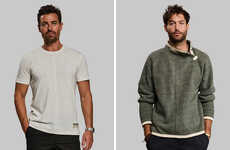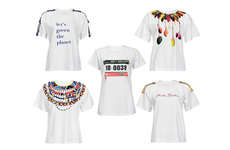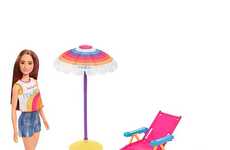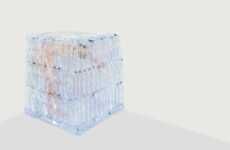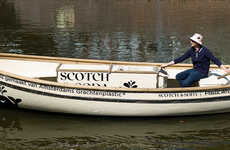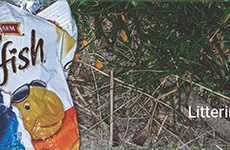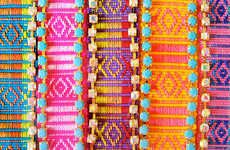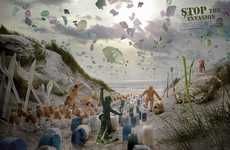
'Plastic is Forever' Sews Pretty Pollution to Organic Cotton T-Shirts
Katie Cordrey — December 14, 2010 — Eco
References: itsamanmadeworld & 750tees.wordpress
Barbara de Vries uses plastic beach litter to decorate organic cotton T-shirts under the brand, 'Plastic is Forever.'
Environmentally polluting bits of trash are hand-sewn onto the T-shirts which are in turn sold online at loomstate.org and at retailers such as Barney's New York. De Vries uses beach plastic gleaned from Bahamas’ beach clean-ups. Part of the proceeds from sales of 'Plastic is Forever' clothing are donated to the Eleuthera Institute and the Island School in the Bahamas.
Check out the video and gallery to see the shirts and the beach plastic that goes into making them.
Environmentally polluting bits of trash are hand-sewn onto the T-shirts which are in turn sold online at loomstate.org and at retailers such as Barney's New York. De Vries uses beach plastic gleaned from Bahamas’ beach clean-ups. Part of the proceeds from sales of 'Plastic is Forever' clothing are donated to the Eleuthera Institute and the Island School in the Bahamas.
Check out the video and gallery to see the shirts and the beach plastic that goes into making them.
Trend Themes
1. Sustainable Fashion - Using organic cotton and beach litter to create unique T-shirts presents disruptive innovation opportunities in the sustainable fashion industry.
2. Upcycling - The use of beach plastic as decoration on T-shirts showcases the potential for upcycling materials and reducing waste in the fashion industry.
3. Social Impact - Donating proceeds to environmental organizations creates a social impact opportunity for businesses in the fashion industry.
Industry Implications
1. Fashion - The use of plastic beach litter and organic cotton in T-shirt production intersects with the fashion industry, offering opportunities for sustainable and socially conscious brands.
2. Environmental Conservation - The initiative to clean up beaches and repurpose plastic waste supports the environmental conservation industry, with potential for further disruptive innovations in waste management.
3. Education - Partnering with the Eleuthera Institute and the Island School in the Bahamas highlights the potential collaboration between the fashion industry and education sector for promoting sustainability and environmental awareness.
5.1
Score
Popularity
Activity
Freshness



